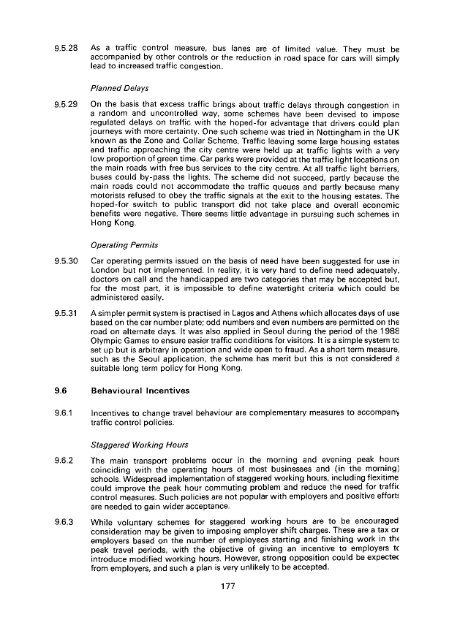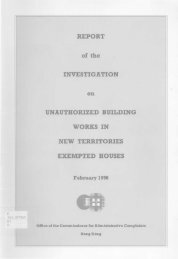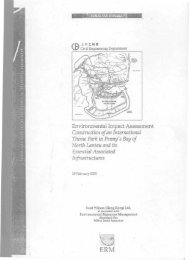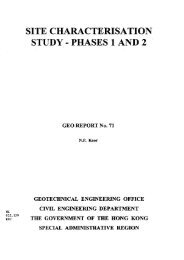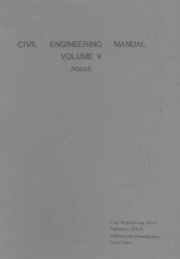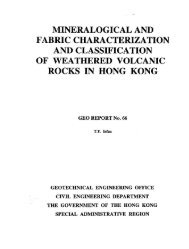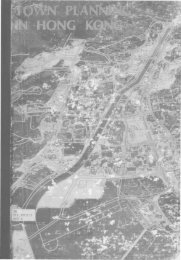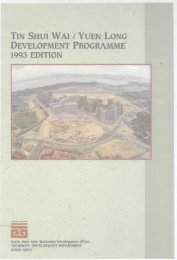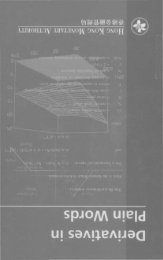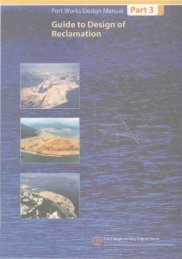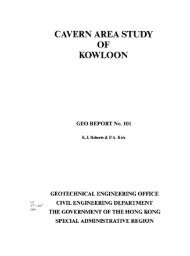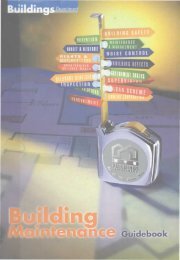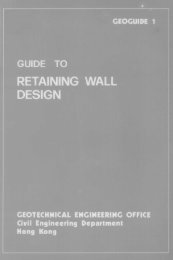Untitled - HKU Libraries - The University of Hong Kong
Untitled - HKU Libraries - The University of Hong Kong
Untitled - HKU Libraries - The University of Hong Kong
- No tags were found...
Create successful ePaper yourself
Turn your PDF publications into a flip-book with our unique Google optimized e-Paper software.
9.5.28 As a traffic control measure, bus lanes are <strong>of</strong> limited value. <strong>The</strong>y must beaccompanied by other controls or the reduction in road space for cars will simplylead to-increased traffic congestion.Planned Delays9.5.29 On the basis that excess traffic brings about traffic delays through congestion ina random and uncontrolled way, some schemes have been devised to imposeregulated delays on traffic with the hoped-for advantage that drivers could planjourneys with more certainty. One such scheme was tried in Nottingham in the UKknown as the Zone and Collar Scheme. Traffic leaving some large housing estatesand traffic approaching the city centre were held up at traffic lights with a verylow proportion <strong>of</strong> green time. Car parks were provided at the traffic light locations onthe main roads with free bus services to the city centre. At all traffic light barriers,buses could by-pass the lights. <strong>The</strong> scheme did not succeed, partly because themain roads could not accommodate the traffic queues and partly because manymotorists refused to obey the traffic signals at the exit to the housing estates. <strong>The</strong>hoped-for switch to public transport did not take place and overall economicbenefits were negative. <strong>The</strong>re seems little advantage in pursuing such schemes in<strong>Hong</strong> <strong>Kong</strong>.Operating Permits9.5.30 Car operating permits issued on the basis <strong>of</strong> need have been suggested for use inLondon but not implemented. In reality, it is very hard to define need adequately,doctors on call and the handicapped are two categories that may be accepted but,for the most part, it is impossible to define watertight criteria which could beadministered easily.9.5.31 A simpler permit system is practised in Lagos and Athens which allocates days <strong>of</strong> usebased on the car number plate; odd numbers and even numbers are permitted on theroad on alternate days. It was also applied in Seoul during the period <strong>of</strong> the 1988Olympic Games to ensure easier traffic conditions for visitors. It is a simple system toset up but is arbitrary in operation and wide open to fraud. As a short term measure,such as the Seoul application, the scheme has merit but this is not considered asuitable long term policy for <strong>Hong</strong> <strong>Kong</strong>.9.6 Behavioural Incentives9.6.1 Incentives to change travel behaviour are complementary measures to accompanvtraffic control policies.Staggered Working Hours9.6.2 <strong>The</strong> main transport problems occur in the morning and evening peak hourscoinciding with the operating hours <strong>of</strong> most businesses and (in the morning)schools. Widespread implementation <strong>of</strong> staggered working hours, including flexitime,could improve the peak hour commuting problem and reduce the need for trafficcontrol measures. Such policies are not popular with employers and positive effortsare needed to gain wider acceptance.9.6.3 While voluntary schemes for staggered working hours are to be encouragedconsideration may be given to imposing employer shift charges. <strong>The</strong>se are a tax oremployers based on the number <strong>of</strong> employees starting and finishing work in thepeak travel periods, with the objective <strong>of</strong> giving an incentive to employers tcintroduce modified working hours. However, strong opposition could be expectecfrom employers, and such a plan is very unlikely to be accepted.177


